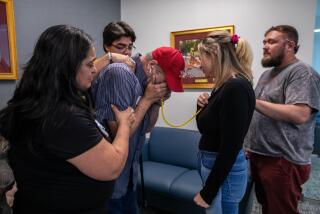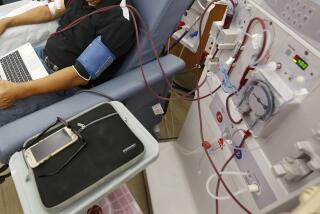How to ease organ transplant shortage
- Share via
Re “How old is too old for a transplant?” Times Special Report, Nov. 5
Americans bury or cremate 15,000 transplantable kidneys every year. We wouldn’t have to worry so much about how to ration life if we weren’t throwing so much life away.
The United Network for Organ Sharing has the power to end most of this waste by allocating organs first to people who have agreed to donate their own organs when they die.
Giving organs first to registered organ donors will persuade more people to register. It also will make the organ allocation system fairer. People who aren’t willing to share the gift of life should go to the back of the waiting list as long as there is a shortage of organs.
Anyone who wants to donate their organs to others who have agreed to donate theirs can join LifeSharers, a nonprofit network of donors who agree to offer their organs first to other donors when they die.
DAVID J. UNDIS
Nashville
The writer is executive director of LifeSharers.
*
Eighty-five-year-old Clois Guthrie was incensed when he was removed from the cadaver kidney recipient list because of age and health complications, yet he was unwilling to accept a kidney from one of three volunteer donors within his family.
Doctors would be less often forced to dispense their own frontier morality when faced with difficult decisions such as what age to eject needy people from the donor list if folks like Guthrie could find and accept a live kidney donation within their circle of family and friends and save the cadaver kidney list for those without this option.
JOHN HUNT
Fullerton
*
The answer to the short supply of kidneys is to pull out all the stops on stem cell research so that everyone who needs a kidney transplant will get one -- no wait, no questions asked and compliments of the American people. That’s why I’ll continue with hemodialysis, waiting for the big breakthrough in which custom-made kidneys will be available for everyone who needs one.
J.R. KENT
Huntington Beach
*
The problem with giving young patients priority over old ones for kidney transplants is nobody knows how long anybody is going to live. Just because a recipient is younger doesn’t mean he or she will live longer.
JOSH RIVETZ
Northridge
*
There is a vital need for public awareness of the growing transplant shortage.
The system depends on organ donors to pre-plan their donation, notify the Department of Motor Vehicles and make sure their family knows. Even with a donor sticker on your driver’s license, an objecting family member can block the transplant. The hospital must ask and get permission for donations quickly and at the hardest time for the unfortunate family.
It would be more humane for the bereaved family and lessen the organ shortage if people who do not want their organs used bear the burden of notifying the DMV and family. The majority wanting to give and receive a second chance at life would see a quick decrease in the transplant list, and the minority who object would still have their right to abstain.
RAY TARKINGTON
Torrance
The writer received a double transplant of kidney and pancreas in 2002 at UCLA.






